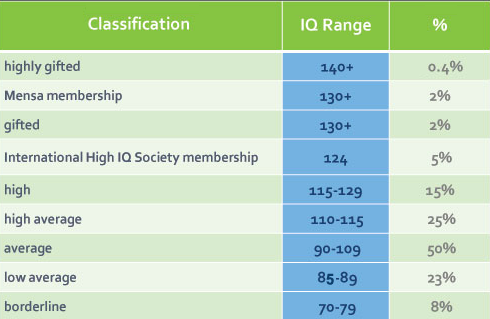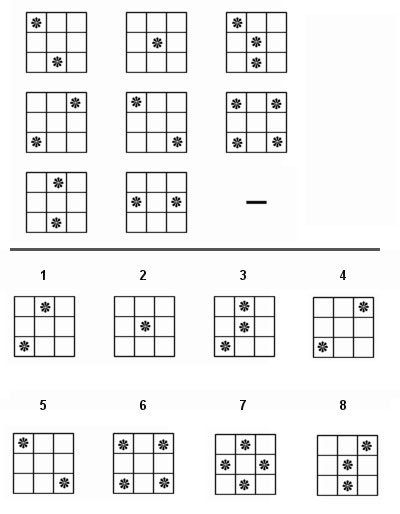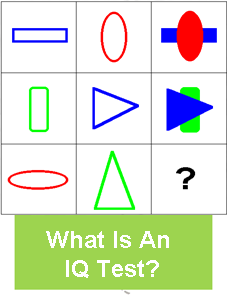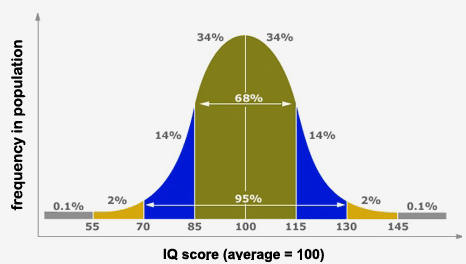What is an IQ Test? What is an Accurate IQ Test?
While people have different cognitive strengths and weaknesses (e.g. language, music, math, visual), consistent correlations between them show us there is a common component to all of these. This common, underlying factor is called ‘general intelligence’ or ‘G‘.
G is measured with a variety of psychometric assessments that are often referred to as “IQ tests”.
IQ tests are the most reliable (e.g. consistent) and valid (e.g. accurate and meaningful) type of psychometric test that psychologists make use of. They are well-established as a good measure of a general intelligence or G.
IQ tests are widely used in many contexts – educational, professional and for leisure. Universities use IQ tests (e.g. SAT entrance exams) to select students, companies use IQ tests (job aptitude tests) to screen applicants, and high IQ societies such as Mensa use IQ test scores as membership criteria.
The IQ Score Bell Curve – A ‘Normal Distribution’
With standardized IQ tests, IQ tests are designed so that their scores have a ‘bell curve’ distribution in the general population with an average of 100. This curve has a peak in the middle where most people score and tapering ends where only a few people score. In statistics this is called a normal distribution. Many variables in nature (such as height and weight) have a distribution of the same shape.
.
IQ bell curve
The area under the curve between scores corresponds to the % in the population between those score. The scores on this IQ bell curve are color-coded in ‘standard deviation units’. A standard deviation is a measure of the spread of the distribution. 15 points is one standard deviation for most IQ tests. Nearly 70% of the population score between 85 and 115 – i.e. plus and minus one standard deviation. A very small percentage of the population (about 0.1% or 1 in 1000) have scores less than 55 or greater than 145 – that is, more than 3 standard deviations out!
A critical insight from research over the past decade is that IQ is not a fixed, genetically determined attribute. An individual’s score on the bell curve is not static. Over time – weeks, months or years – an IQ level can change substantially. Here is a general information on evidence-based methods for how to increase IQ long term.
What is an Average IQ?
Standardized IQ tests are designed so that the exact average (mean) IQ score in the general population is 100. An ‘average IQ score’ or ‘normal IQ score’ can be defined as a score between 85 and 115 – between plus and minus one standard deviation from the average. (See the table below).
What is a High IQ Score? What is Mensa Standard?
An IQ of 115 or more can be considered to be a high IQ level. Only 15% of the population have an IQ level of 115 or above. There is no magic bullet but in general it is thought that:
- An IQ of 110 or above enables you to attain a college level education if you choose it.
- If you have an IQ of 115 or above you are capable of the cognitive demands of almost any profession, and can attain the highest levels of education and training.
The entry score for An IQ of 124 is needed to become a member of the International High IQ Society. This is the first entry-point score into high IQ societies.
Around 2% of the population has an IQ greater than 130 which is ‘gifted’ intelligence. This is an IQ of 2 standard deviations from the average IQ. This is Mensa standard – IQ score on a valid, standardized IQ test required to become a member of Mensa.
IQ Level Scale
This table indicates how IQ levels can be classified. The IQ ranges are conventional ones.

Types of Intelligence Tests
IQ tests are administered by school districts (e.g. the Cognitive Abilities Test (CogAT)), private psychologists (see below), the military (e.g. Army GCT) and human resource departments (e.g. the Wonderlic).
There are two broad types of intelligence test:
- ‘Culture-fair’ tests of fluid intelligence (Gf), which is our ability to reason and problem solve, independently of familiarity, training and practice.
- ‘Full-scale’ IQ tests, made up of subtests for fluid intelligence (Gf) as well as (typically) vocabulary and general knowledge, visuo-spatial ability, short term memory, and processing speed. Sometimes quantitative/mathematical reasoning is also tested in ‘full scale’ tests.
Very popular among standard intelligence tests
- Raven’s Progressive Matrices Test (fluid intelligence test)
- Raven’s Advance Progressive Matrices Test (fluid intelligence test)
- Cattell Culture Fair Intelligence Test (fluid intelligence test)
- Wechsler Adult Intelligence Scale (full scale test)
- Wonderlic Cognitive Ability Test (full scale test)
Mensa accepts scores from approximately 200 different standardized intelligence tests (click for qualifying test information here).
Raven’s tests are popular career / job aptitude tests. As described by the publishers of the Raven’s Advanced Progressive Matrices Test:
The APM score can be used as an indication of a candidate’s potential for success in high-level technical, professional, and executive positions that require high levels of clear and accurate thinking, problem identification, holistic situation assessment, and monitoring of tentative solutions for consistency with all available information. The APM score also can be used for developmental purposes in occupational and advanced educational settings. The nonverbal aspect of the test minimizes the impact of cultural or language bias.
Progressive Matrices Tests
The Ravens IQ tests are progressive matrices tests.
Here is an example of a progressive matrix problem:

This kind of test has proved to be an excellent measure of fluid intelligence (Gf) – your ability to problem solve and reason ‘off the cuff’ – without prior practice.
How To Test IQ? How Do You Find Out Your IQ?
Knowing that most IQ tests on the internet are not standardized tests, f you want to test your own IQ level, how do you go about it?
One approach is to take a professional IQ test administered by a qualified test-administrator, such as a private psychologist or a Mensa test official.
Professional IQ Tests
Professionally administered IQ tests (e.g. WAIS-IV or Cattell III B) give you an accurate measure of your IQ level. They are typically administered by a certified psychologist, educationalist or clinician. They cost to you will be in the region of $300-$500 for an assessment. The test kits can be purchased independently – at a high cost: $1,110.00 for the test battery (link).
A cost-effective method of measuring your true IQ level is to take a Mensa Supervised Test. Mensa offers supervised IQ tests ( $40.00 in the US / £17.50 in the UK). This fee includes:
- A reserved place at the centre of your choice.
- The opportunity to take two IQ test papers. The Cattell III B and the Cattell Culture Fair III A.
- The marking of your IQ test papers and your results returned to you in confidence.
Mensa Supervised test sessions are held at centres throughout your home country.Click here for details from International Mensa. For those in the US click here. For those in the UK click here.
Online IQ Tests
There are many so-called ‘IQ tests’ online. The vast majority these or more are not scientifically valid or standardized. They may be fun, they may even be good for training purposes, but they are worthless as a measure of your true IQ.
The GIQ Test
This online IQ test will give you a valid estimate of your IQ.This is a good general IQ test, combining non-verbal (spatial) and verbal problems, providing a reasonably valid measure of your IQ.
The fee is only $10.
According to the test-makers:
The GIQ Test is an online analog for the most common clinically proctored IQ tests. In our internal study, the GIQTest correlated within about 4% of an individual’s full scale score on a clinically proctored IQ test. The GIQTest’s sections are modeled after clinical IQ test sections.
The GIQ has the following features
- Time required: 25-45 minutes estimated. No time limit.
- Components of intelligence measured: full scale intelligence, ‘verbal’, ‘spatial’ and ‘quantitative’ intelligence. Your performance sub-score on this test can substitute as a measure of your fluid intelligence.
- Culture fair IQ test? No. Vocabulary, similarities and arithmetic subtests are culture-dependent.
- Repeat testing: No
- Fee: $10
Subscribe for free eBooks on IQ tests and IQ augmentation





That’s interesting that the average IQ score is between 85 and 115 points. I’ve always loved to learn and have been wondering how quantitatively smart I am. I should find somewhere to test my IQ now that I know what the average is.